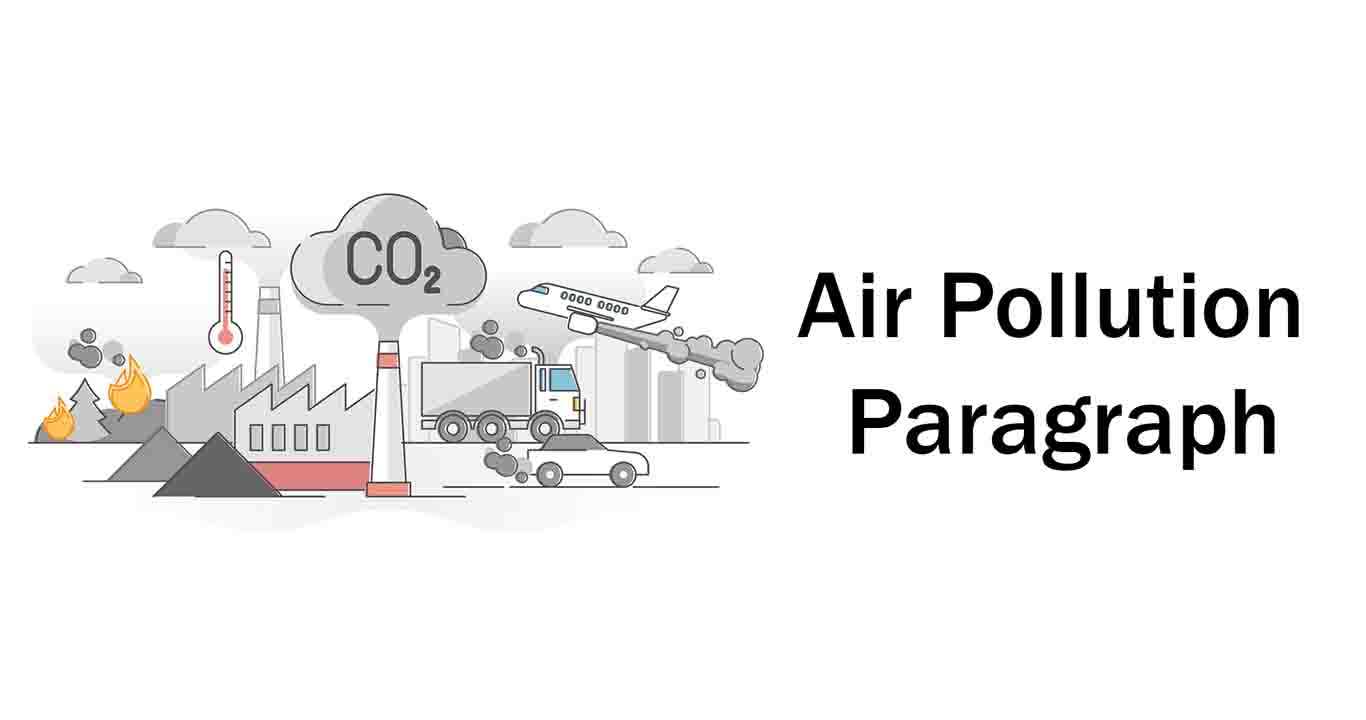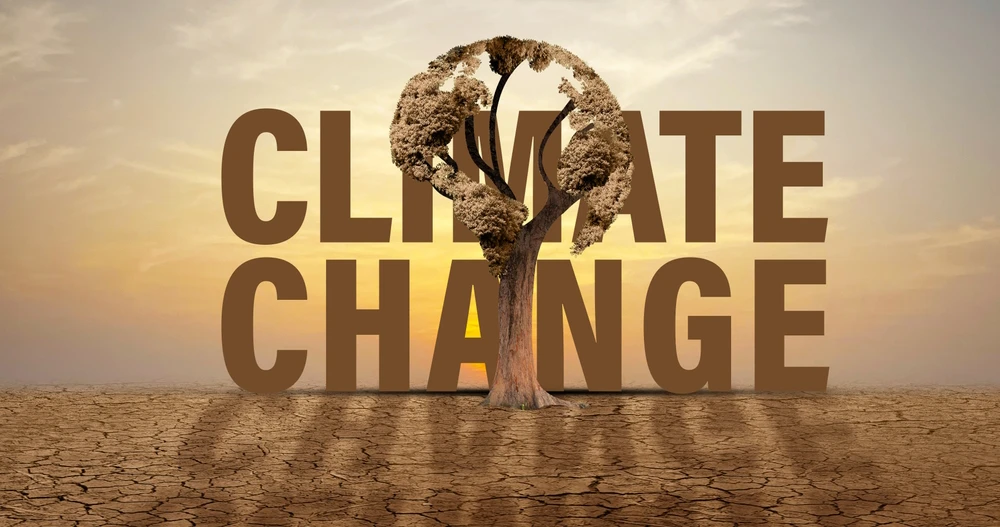Air Pollution Paragraph for hsc, ssc and any Exam

Air pollution refers to the presence of harmful substances in the air, including particulate matter, nitrogen oxides, sulfur dioxide, and other pollutants. It is caused by a variety of human activities, including industrial processes, transportation, and the burning of fossil fuels. Air pollution can have serious impacts on human health, including respiratory problems, heart disease, and other health issues. It can also harm the environment, including damage to crops, forests, and other ecosystems. To address the problem of air pollution, it is important to take a comprehensive approach that involves stricter regulations, better enforcement, and increased investment in cleaner technologies and sustainable practices. This may include promoting clean energy, implementing stricter air quality standards, and encouraging the use of alternative transportation options. In addition, individuals can play an important role in reducing air pollution by making small changes in their daily lives. This may include using public transportation, reducing energy consumption, and reducing the use of fossil fuels. By working together to reduce air pollution, we can help protect the health and well-being of people and the environment and ensure a healthy and sustainable future for all.
Air Pollution Paragraph for HSC
Air pollution is a major environmental issue in Bangladesh, affecting the health and well-being of millions of people. It is caused by a range of factors, including industrial activities, transportation, and the burning of fossil fuels. The air quality in many areas of Bangladesh has reached dangerous levels, with high levels of particulate matter, nitrogen oxides, and other pollutants present in the air. One of the major sources of air pollution in Bangladesh is the rapid industrialization that has taken place in recent years. Many of the factories and power plants in the country lack adequate air pollution control systems, leading to high levels of emissions. In addition, the transportation sector is a significant contributor to air pollution, with high levels of emissions from vehicles, buses, and trucks. The impacts of air pollution in Bangladesh are far-reaching and have serious health consequences for millions of people. The high levels of particulate matter and other pollutants in the air can cause respiratory problems, heart disease, and other health problems. In addition, air pollution can also lead to acid rain, which can damage crops, forests, and other ecosystems. To address the problem of air pollution in Bangladesh, it is important to take a comprehensive approach that involves stricter regulations, better enforcement, and increased investment in cleaner technologies and sustainable practices. This may include the implementation of stricter air quality standards, the promotion of clean energy, and the development of alternative transportation options. In conclusion, air pollution is a critical environmental issue in Bangladesh, affecting the health and well-being of millions of people. To ensure a healthy and sustainable future, it is essential that the government, businesses, and communities work together to reduce emissions and improve air quality. By taking action to reduce air pollution, we can help protect the health and well-being of people and the environment.
Air Pollution Paragraph for SSC
Air pollution is a major environmental issue that affects the health and well-being of millions of people around the world. It is caused by a variety of factors, including industrial activities, transportation, and the burning of fossil fuels. The air quality in many areas has reached dangerous levels, with high levels of particulate matter, nitrogen oxides, and other pollutants present in the air. One of the primary sources of air pollution is industrial activities, including factories and power plants that emit high levels of pollutants into the air. The transportation sector is also a significant contributor to air pollution, with emissions from vehicles, buses, and trucks causing high levels of pollution. The impacts of air pollution are far-reaching and have serious health consequences. The high levels of particulate matter and other pollutants in the air can cause respiratory problems, heart disease, and other health issues. In addition, air pollution can also lead to acid rain, which can damage crops, forests, and other ecosystems. To address the problem of air pollution, it is important to take a comprehensive approach that involves stricter regulations, better enforcement, and increased investment in cleaner technologies and sustainable practices. This may include promoting clean energy, implementing stricter air quality standards, and encouraging the use of alternative transportation options. In conclusion, air pollution is a critical issue that affects the health and well-being of millions of people. By taking action to reduce air pollution, we can help protect the health and well-being of people and the environment and ensure a healthy and sustainable future for all.
Air Pollution Paragraph Key Points
1. What causes air pollution?
Air pollution can be caused by a variety of natural and human-made sources, including industrial emissions, transportation, burning fossil fuels, agricultural activities, and natural phenomena such as wildfires and volcanic eruptions.
2. What are the health effects of air pollution?
Air pollution can have a range of negative health impacts, including respiratory problems such as asthma and chronic obstructive pulmonary disease (COPD), cardiovascular disease, stroke, and even cancer. It can also exacerbate existing health conditions and harm vulnerable populations such as children and the elderly.
3. How can we reduce air pollution?
Reducing air pollution requires a combination of individual and collective actions, such as promoting cleaner technologies, using public transportation, reducing energy consumption, and supporting policies that encourage the use of renewable energy and reduce emissions from industry.
4. What are the most polluted cities in the world?
Some of the most polluted cities in the world include Delhi, Beijing, Karachi, and Moscow, among others. However, air pollution is a global problem that affects both urban and rural areas.
5. How does air pollution contribute to climate change?
Air pollution can contribute to climate change by releasing greenhouse gases such as carbon dioxide and methane into the atmosphere, which trap heat and contribute to global warming. It can also have other environmental impacts such as acid rain and damage to ecosystems.
6. How does air pollution affect wildlife?
Air pollution can harm wildlife by damaging their habitats, reducing the availability of food and water, and causing respiratory and other health problems. It can also contribute to global warming, which can have further negative impacts on wildlife and their habitats.
7. How can I protect myself from air pollution?
Individuals can protect themselves from air pollution by staying indoors during times of high pollution, using air purifiers or masks, and avoiding areas with heavy traffic or industrial activity. It is also important to support policies that address air pollution and promote public health and environmental protection.









